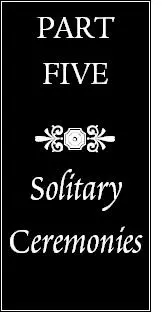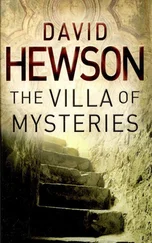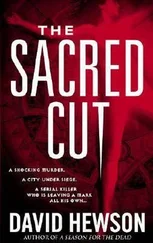In the boatman’s hands, held with a lazy, knowing grace, was a long, old shotgun, double-barrelled, as worn and used as the man himself. A man who now punched the weapon into Hugo Massiter’s chest, propelled him viciously to the great bowed window, sending him back so hard the Englishman’s head cracked against the glass, shattering it with a sudden, piercing crash.
Hugo Massiter howled in pain and shock.
“No,” a female voice said, and Teresa was unsure where the sound came from, the handcuffed woman, Raffaella Arcangelo, or her own dry throat.
“What do you want?” Massiter roared, raising a hand to his head, looking in astonishment and shock at the blood some hidden wound at the back of his scalp deposited on his fingers. “What insanity is this?”
“I want nothing,” the boatman replied quietly, calm, unworried.
Massiter’s face contorted with fury.
“Venetians! Venetians! Name your price and be done with it. A man like me has bought the likes of you all before. I’ll buy you all again, twice over, if that’s what it takes.”
Piero Scacchi didn’t flinch, didn’t take his eyes off the pompous Englishman trapped against the gleaming glass. “You make two mistakes,” he said. “One: I am not a Venetian. Two: you are not a man.”
The gun jerked, the room filled with its terrible roar. Hugo Massiter’s torso rose in the air, flew back against the stains of the bull’s-eye windows, and was caught there by a second explosion, one that ripped his chest apart, thrust him out of the room altogether, out into the open air where, for one brief moment, he appeared suspended in a sea of whirling shards, a dying man flailing in a cloud of glass that reflected his agony as it tore his shattered body to blood and bone.
Then he was gone, and from the unseen quay below came a mounting communal murmur, more animal than human, a buzzing, humming storm cloud of fright, punctuated by the growing rattle of screams.
She was half aware of one other event too. Peroni had finally reached the boatman, held him at the fractured windows, with just enough strength to stop him from following his victim out into the golden evening before finally, more through the man’s own lassitude than Peroni’s considerable force, grappling him to the floor.
“It didn’t match, Nic,” Teresa Lupo whispered, finally able to get the words out of her mouth though she knew no one else could hear. “It didn’t match at all.”


IT WAS THE SECOND WEEK OF SEPTEMBER, LATE AFTERNOON under a sun losing its power. An unseasonable hint of chill, the coming death of summer, lurked within the breeze rising from the Adriatic. It chased across the grey waves, buffeting their faces as they waited on the edge of the graveyard on San Michele. Funerals always made Leo Falcone uncomfortable, though he’d been to many over the years. Now he was trapped inside a wheelchair, reliant on others in a way he found disturbing, a way that reminded him of a younger Nic Costa, once stricken in much the same fashion. There was no easy form of escape, no excuse to put work before personal matters. Nothing but the relentless internal reflection that had been dogging him for a week or more.
“Leo?” Raffaella asked. “Are you ready? Michele was too stingy to pay for private transport back. The boat service stops soon. We don’t want to miss it.”
“A minute,” he said, recalling the coffin going into the fresh ochre earth beyond the line of cedars that separated them from the plots. “I was thinking.”
There’d been so much time for that lately. Fresh thinking. Old thinking, the kind that had happened before he awoke and which still remained in his head, clear and unwilling to go away. The question, as Leo Falcone understood only too well, was what to do with those dark, unsettling reflections.
When Uriel Arcangelo went into the ground, a temporary sojourn, like every San Michele corpse, to be removed a decade hence to make way for more dead, his interment had been watched by just five personal mourners. The three Arcangeli, newly enriched by Hugo Massiter’s purchase of their island, Falcone, and the lawyer who had handled the family estate. The black-suited, quietly officious men of the funeral company outnumbered family. It seemed apposite somehow. The Arcangeli never ceased to be outsiders, even in death.
At least Uriel had received a more proper end than Massiter. The Englishman’s power had vanished the moment his body shattered on the island’s worn paving stones, scattering the crowds, sending them screaming. When Massiter died some spell was broken. Venice was acutely aware of social status. The city’s burghers escaped discovery of their illicit financial transactions. The Arcangeli found their own money problems transformed, escaping from poverty to comparative riches overnight. The future of the island remained as much in doubt as before, but it was now someone else’s problem, an architectural curio left in legal limbo, owned by the estate of a man with no known relatives, no apparent heirs. Already there were mutterings in the local press about a campaign to take it into public ownership. A hotel and an apartment block would one day rise on the Isola degli Arcangeli. Falcone felt certain of this. The way the family, even Michele, acquiesced to the notion after Massiter’s demise indicated, surely, that its days as a struggling glass enterprise were past.
All the same, he found it remarkable how little the name of Hugo Massiter entered into any conversation or public discussion. After the initial flurry of publicity about the arrest of Piero Scacchi on a charge of murder, the story had swiftly died away. The previous day there had been a brief paragraph on an inside page of one newspaper revealing that Massiter’s body had been flown to England for a private burial paid for by his estate, an event that would, Falcone suspected, be watched by lawyers and accountants, if anyone at all. For Venice, at that point, in some final solitary ceremony, the issue of culpability would be closed, interred alongside the ravaged flesh and bone of Hugo Massiter. No one had been brought to account for the killing of Gianfranco Randazzo, which was, the papers now hinted, the result of a gangland row over an extortion racket in which the late commissario had been involved. No one, it seemed, much remembered the deaths of Aldo Bracci, or Uriel and Bella Arcangelo. Venice had a capacity for forgetfulness which Leo Falcone almost envied.
He forced himself to concentrate on the present, and gazed at her with that slow, selfish hunger allowed to a man confined to a wheelchair. Raffaella Arcangelo looked serene, complete somehow, in mourning. She wore a long black dress, expensively cut, and a thin woollen jacket against the cutting breeze. Her hair had been styled by a professional, probably for the first time in years, he guessed, and now curved into her attractive, scarcely lined face. She had the appearance of an intelligent and elegant college professor, something, it occurred to Falcone, she could perhaps have been had the island not dragged her home from Paris out of financial necessity.
“What will you do now?” he asked.
She smiled, a little shyly. “It’s taken a long time for you to frame that question, Leo.”
There was no reproach in her soft voice, though perhaps he deserved some.
He glowered at the wheelchair, unintentionally. “I’m sorry. My mind’s been on other things.”
“Of course,” she replied. “I was being thoughtless. You deserve some indulgences.”
Читать дальше














